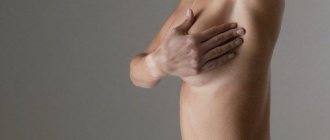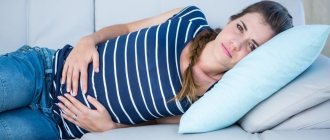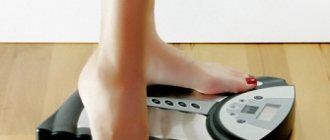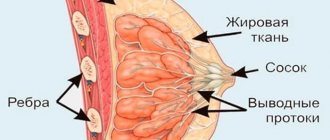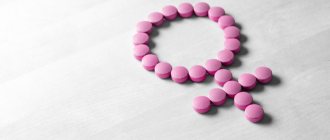Physiology
Depending on what phase the menstrual cycle is in, a woman’s condition, both psychologically and physically, is different.
As a rule, you feel better in the first half of the cycle. Before menstruation, which is from 2 to 14 days, PMS (premenstrual syndrome) occurs and the woman feels unwell.
A number of disorders are observed in the body: vegetative-vascular, endocrine, and mental disorders.
Women with mental health problems are most susceptible to the negative consequences of PMS. When diagnosed with manic-depressive psychosis, 86% of women experience PMS symptoms.
The manifestation of PMS is characterized by the following signs:
Other painful sensations are also observed. Immediately before menstruation, women may experience changes in behavior and mood: unreasonable aggression, increased sensitivity, irritability and malice.
These are signs of so-called dysphoric disorders. Along with this, sleep disturbances occur, appetite becomes sluggish, and sexual activity is impaired.
A state of fear and anxiety may also be present.
Depressive and anxiety states may increase against the background of PMS. During this period, there is an increased risk of suicide.
During PMS, women with mental disorders of an endogenous nature experience an exacerbation of their mental state. Manifestations of the disease can be detected at a young age in teenage girls. This makes it possible to take preventive measures and diagnose depression at an early stage. Menstruation is a kind of indicator for identifying abnormalities in mental health.
During menstruation, the body weakens its ability to resist stress, and the nervous system is vulnerable. Variability in mood clearly increases in the initial and final stages of depression with cyclothymia.
Women usually do not resort to the help of doctors with PMS, but use folk remedies. In the presence of pronounced mental disorders, one cannot do without qualified medical assistance and a course of treatment with psychotropic drugs.
Psychotherapeutic correction is also carried out. Depression before menstruation requires treatment. Even if the patient has recovered from the state of depression, but negative conditions are observed before menstruation, then taking antidepressants should be continued until the symptoms are eliminated and the disease relapses. Antidepressants should have minimal side effects and be easy to tolerate.
What are the dangers of insomnia during PMS?
Regular sleep problems, characteristic of premenstrual syndrome, negatively affect both a woman’s physical health and her emotional state. This period for the female body is always associated with serious stress, associated, first of all, with the ongoing hormonal shift. At the same time, general weakness increases, which with the arrival of menstruation only intensifies due to blood loss. Accordingly, during this period, a good night's sleep and rest are especially important, which will help you quickly restore strength and return to the usual rhythm of life.
Insomnia can lead to even more irritability
In addition, due to insomnia during menstruation, irritability, anxiety, nervousness and depression, which already cause women a lot of trouble during this period, can significantly increase. But any disturbances in the functioning of the nervous system always have negative consequences, which may manifest themselves in the future during pregnancy or childbirth. That is why serious problems with sleep during PMS and during menstruation cannot be ignored, treating them as just temporary difficulties that will disappear on their own in a couple of weeks.
Prevention
For preventive purposes, according to the recommendations of specialists, the diet should be adjusted. Food is consumed without salt in large quantities. The use of infusions with a diuretic effect should be increased. Nutrition should be healthy and balanced
Particular attention should be paid to the presence of vitamin B6 and potassium in food products.
To do this, you should include the following products in your diet:
chocolate, grapes, raisins, cocoa, fish, bananas, eggs, apples, broccoli.
In cases of depressive exacerbations, a course of medication is taken. Injections of solutions with vitamins A, B6, E, magnesium and calcium. This will bring metabolic processes in the body and hormonal levels back to normal. Sports, physical education, and fitness can relieve unpleasant symptoms.
Unfavorable factors
Lifestyle, nutrition, and environment affect a woman’s well-being before her period.
Nutrition. Currently, the quality of food leaves much to be desired. GMOs, dyes, flavor enhancers, flavors, and other chemical additives adversely affect the gastrointestinal tract. Before menstruation, intestinal and stomach diseases worsen. Nausea, vomiting, gas formation, diarrhea, etc. appear
In addition, ladies pay little attention to their diet. And sometimes there is just catastrophically not enough time for fully cooked food
Convenience foods, snacks, spicy, salty, fried foods disrupt metabolism and contribute to fluid retention in the body. Before critical days, swelling, weight gain, increased sweating. Beauty requires sacrifice. Sometimes starvation diets exhaust the body so much that menstruation does not come at all or bleeding begins due to the lack of necessary components. Nutrition should be complete. At least 2 weeks before your expected period, you should follow a diet to relieve the digestive system.
Bad habits. We can talk endlessly about the dangers of smoking and alcohol on the female body. There is no organ that is spared the negative impact.
Nervous fatigue. The influence of the nervous system on the female body is underestimated by ladies themselves. Meanwhile, severe stress, nervous tension, and an unfavorable psycho-emotional environment at home and at work aggravate the manifestations of the syndrome and significantly worsen well-being. It has been noticed that in women engaged in mental work, the manifestations of PMS are much stronger.
Lack of physical activity, sedentary lifestyle. Under such conditions, blood stagnation occurs in the pelvic organs, the ability of the uterus to quickly reject the endometrial layer decreases, pain increases, and metabolism is disrupted. Your period may come late, your discharge may be scanty or heavy.
Diseases. Of course, in the period before menstruation, all diseases worsen. The presence of hidden diseases, chronic, infectious, significantly worsens well-being.
When a woman is happy with her beloved man, satisfied with her job, children are happy, there is no shortage of money, there is time for rest, good sleep, poor health before menstruation is a fleeting phenomenon. Unfortunately, fate gives such living conditions to a few. You need to learn to cheer yourself up, be more happy, not pay attention to the small troubles of life, and value your women's health.
How to deal with insomnia?
If insomnia occurs frequently, almost every menstrual cycle, then it is useless to combat it with sleeping pills. Such medications only relieve symptoms, but do not eliminate the cause of the disorder. To get rid of the problem once and for all, you should make it a rule to prepare for menstruation in advance, starting from the 20-23rd day of the cycle. What measures need to be taken:
- Adjust your diet. The week before your period you need to eat right. Meals should be taken 4-5 times a day in small portions. Your diet should include fermented milk products, fruits, vegetables, cereals, and soups every day. It is better to limit meat to 100 g per day. You can eat lean fish, baked or boiled, without restrictions. If you want something “harmful”, then eat such a dish before 4 pm and without abuse.
- Have a full rest. A week before your period, you should avoid overwork. It is recommended to postpone heavy physical work or training to a more appropriate time. Sleep should begin no later than 11 pm and last at least 8 hours.
- Avoid worries and stress. If you feel increased irritability, nervousness or tearfulness before your period, it is recommended to drink herbal tea. You should brew 1 teaspoon of valerian, 2 tablespoons of lemon balm (mint) and chamomile in 500 ml of boiling water. You can add lemon or honey to the drink and drink it half a glass before meals for about a week. This decoction normalizes the activity of the nervous system, relieves tension, improves metabolism and sleep.
If PMS is accompanied by severe symptoms and pain, then you do not need to endure it. For headaches, you should take Citramon, for pain in the lower abdomen, No-shpu. It is better to consult your doctor for more details on this topic. Severe PMS sometimes requires specific treatment; it may be caused by pathologies of the thyroid gland, endometriosis or other diseases.
Features of the female body
A woman’s body is a very complex system, the main purpose of which is the continuation of the human race and the ability to bear children. That is why every month every representative of the fair sex, starting from about 13-14 years old, faces a problem of an intimate nature, in which blood is released from the genital tract along with mucus.
The menstrual cycle is a period of time that is counted from the first day of menstruation to the first day of the next menstruation. Typically, the duration of the menstrual cycle depends on the individual characteristics of a particular female body, as well as on some other factors.
Ways to combat insomnia before menstruation
First of all, with insomnia, it is necessary to find out the cause of this condition, especially if there are any specific complaints. If sleep disturbance is just a psycho-emotional disorder, you can try to improve sleep, including changing your lifestyle, diet and using traditional medicine.
Traditional medicine for insomnia
Traditional medicine offers many different ways to combat sleep disorders. Popular and effective ones include the following:
Honey. It is recommended to take the beekeeping product at night. You can use kefir - two tablespoons per glass.
There is also an option with lemon juice and walnuts - mix two tablespoons of honey with the same amount of nuts, add lemon juice.
- Valerian. You need to take the root of the plant, chop it and take two tablespoons. Pour 500 ml of water at 100 degrees, let stand for about half an hour. Take a tablespoon 30 minutes before bedtime.
- Dill. You need to take 15 g of fresh plant and pour 500 ml of boiling water. Leave for at least 8 hours. Take in equal portions throughout the day.
- Soothing tea. You need to take 20 g of lemon balm leaves, 30 g of motherwort and valerian root. Pour water at 100 degrees, leave for a day and then take 40-50 ml orally.
Watch this video about traditional methods of treating insomnia:
Traditional medicine
Modern drugs that can be used to normalize sleep include drugs from different groups. Among the most effective are the following:
- Sleeping pills. They can only be purchased with a doctor's prescription. Only a specialist can select the required group of medications and establish a safe dose. Among the popular ones are Somnol and others.
- Herbal remedies. There are a large number of tinctures and herbal preparations to improve sleep. St. John's wort can be seen especially often in the composition. As a rule, they have a mild sedative effect - Deprim, Novopassit, Valocordin and others.
Magnesium based. It is believed that magnesium relaxes the nervous system, smooth muscles of all internal organs and thereby improves sleep. The imbalance of microelements in the second phase of the cycle in women is especially relevant. Therefore, taking magnesium supplements can significantly improve sleep quality.
It is convenient that such medications are sold in pharmacies without a doctor’s prescription, for example, Magnesium B6, Magnefar, Magnelek and others. They can be in the form of tablets, capsules or powder for oral administration.
Based on trypotophan. This substance is essential for normal sleep. Tryptophan produces melatonin (during the day) and serotonin (as darkness falls). The latter is necessary for normal sleep. Therefore, the room should be as dark as possible. Over the years, the level of melatonin synthesis decreases, and the balance is also disrupted in those who work at night. Such people can take medications based on tryptophan - Melason, Tryptophan and others.
General recommendations
You can improve your sleep quality without taking medications. The recommendations in this case are as follows:
You should avoid foods and drinks that stimulate the nervous system - coffee, sweet, strong tea, salty foods, etc. If it is difficult to completely eliminate it from the diet, you should at least not consume it in the afternoon. Include more foods in your menu that are sources of magnesium and tryptophan. These are bananas, nuts, milk, buckwheat, dates, beans, apples and others. Make it a rule to take evening walks in the fresh air and ventilate the room before going to bed in any weather. Make sure that the room temperature is no higher than 22 degrees, and the humidity is at least 40-50. Otherwise, uncomfortable sleeping conditions are created. Choose a pillow, blanket, mattress to suit you. Before going to bed, you can conduct an aromatherapy session with soothing oils - lavender, mint, etc.
r It is important to follow a routine - go to bed at approximately the same time. Lead an active lifestyle with a high level of physical activity.
We recommend reading about how premenstrual syndrome manifests itself. From the article you will learn about why PMS occurs, symptoms and diagnosis of the condition, and medications for treatment.
And here is more information about why you want to eat before your period.
Sleep disturbance is one of the common causes of poor health and decreased performance. They occur especially often in women in the second phase of the cycle. First of all, you need to analyze your condition and try to find out the cause of the disorder, and if necessary, consult a doctor. In most cases, insomnia can be dealt with by changing habits, lifestyle and diet, and taking simple and affordable medications.
How to avoid night leaks during menstruation!
Many women, at least once in their lives, have experienced waking up in the morning in a blood-stained bed. At the same time, you cannot help but be upset by the fact that blood stains are quite problematic to remove from light-colored sheets and clothes. However, there is no need to panic - find out what you can do to avoid staining your sheets and laundry at night and waking up in a red puddle in the morning!
Use nighttime pads.
The name of the night pads speaks for itself - they are designed for use at night, absorb more blood and leak less. At night, you can use just one such pad, or if you have very heavy periods (or when your pads are constantly moving), place one pad between your legs, and fasten the second one to the front or back of your panties, depending on the position in which you sleep.
- Some people recommend using super-absorbent tampons at night, but this is best avoided. If you're in your teens or tend to sleep more than eight hours at night, leaving a tampon in your vagina for more than 8 hours can give you deadly toxic shock syndrome.
- If you use pads and sleep on your back, position the pads backwards to better protect you from leaks. It is also wise to use longer spacers.
Use a menstrual cup.
This device, like a tampon, is located in the vagina, but rarely provokes toxic shock syndrome, therefore, unlike tampons, it can be used for up to 12 hours (including at night). A menstrual cup holds more secretions than tampons or pads, while providing a gentle suction on the inside to prevent leaks.
- There is still a risk of toxic shock syndrome if you wear your menstrual cup continuously for more than 12 hours, so be sure to periodically empty and rinse the device when you use it.
Try using reusable cloth pads.
You can even make them yourself. Cloth pads provide better air circulation in your underwear, and some women find them more comfortable than disposable pads. Also, if necessary, you can always insert an additional layer into them. The greater comfort of cloth pads will help you sleep more restfully, so the pads will stay in their proper place instead of shifting and leaking.
Wear two pairs of panties at once.
It may seem strange, but two pairs of panties will better hold the pad in place while you sleep. Moreover, the second panties will provide an additional protective layer, which in case of leakage will serve as another fabric barrier between the blood and the sheets.
- Alternatively, wear thicker panties or tight night shorts at night that you don't mind getting dirty.
Premenstrual syndrome and causes of insomnia
To understand the causes of insomnia during PMS, you need to know what this formulation is. PMS is a premenstrual syndrome, during the development of which a complex complex of hormone activation occurs in the female body. This affects the functioning of the heart, endocrine and nervous systems, as well as the vascular network.
These problems, as a rule, are associated precisely with the beginning of the development of critical days, that is, they say that menstruation will begin in 2-3 days. There is no point in thinking that a woman is developing a disease of one of the above organs or systems, since the symptoms that appear during premenstrual syndrome only indicate menstruation.
Sometimes representatives of the fair sex may notice pain or discomfort in the heart, an increase in nervous activity, but there is no need to take any measures to treat this condition.
Signs of the onset of the premenstrual period are as follows:
- increased desire for a sexual partner;
- pelvic pain of varying nature and intensity;
- physical weakness;
- high and causeless irritability;
- general discomfort in the body;
- increase in appetite.
Why does insomnia develop during premenstrual syndrome? Doctors identify several causes, one or more of which may be responsible for insomnia. These include:
Hormonal balance
To begin with, it is worth noting the sharp change in the hormonal balance in the body, or more precisely, in the woman’s blood. Before the onset of menstruation, the level of sex hormones, namely estrogen and progesterone, increases sharply. Such substances are responsible for the normal and natural onset of ovulation.
insomnia before menstruation
If there is a violation in their quantity or ratio, this can lead to serious hormonal imbalance, which negatively affects overall health. At this time, the patient will notice a strong sexual desire, and will also suffer from lack of sleep, because her body will not work in its usual mode, which means that the body will not be able to relax, which contributes to normal sleep.
Change in micronutrient levels
We also must not forget that during the menstrual cycle in the human body there is a decrease in certain types of microelements. To a greater extent, these include calcium, which is present in large quantities in the endometrial layer - it is this that comes out of the vagina during menstrual periods, creating red blood discharge.
The absence of this element negatively affects the functioning of the body, since it must be present in a person for a normal and healthy existence. A lack of calcium leads to health problems and the development of pathological symptoms.
This is why doctors say that the onset of insomnia can occur before the onset of menstrual periods - this phenomenon is associated with a lack of nutrients in the body.
Such reasons are considered the main ones - why insomnia occurs during the premenstrual period.
Causes of insomnia before menstruation
Insomnia is considered to be a disturbance in the duration or quality of sleep. Moreover, there are no unambiguous criteria for how many hours a person should sleep, since the normal duration of rest is different for everyone.
The main signs of insomnia are as follows:
- Trouble falling asleep - a person needs a lot of time to fall asleep.
- Frequent waking up at night, after which it is difficult to fall back to sleep.
- During the day, a person is worried that he cannot sleep and rest properly.
- Efficiency and mood decrease, weakness and lethargy appear.
There are many causes of insomnia, ranging from various somatic diseases to psycho-emotional disorders. In women, sleep disturbances usually appear in the second phase of the cycle. This is primarily due to changes in hormonal levels - the predominance of progesterone and a decrease in estrogen levels entail a number of functional changes. Namely:
- Due to the relaxing effect on smooth muscle fibers, women on the eve of menstruation more often experience digestive disorders - heartburn, bloating, constipation. This can significantly impair the process of falling asleep and cause getting up at night.
- Tendency to depression. In women, fluctuations in the level of estrogens, androgens and gestagens often lead to decreased mood and increased suspiciousness, which can cause sleep disturbances.
- Episodes of changes in blood pressure. Especially typical for women of perimenopausal age. On the eve of menstruation, blood pressure jumps more often, episodes of hypertensive crisis (extremely high blood pressure) are possible, which is why a woman can wake up at night - a headache appears, which is alarming.
- General psycho-emotional lability. The second phase of the cycle is generally characterized by more noticeable mood swings. General irritability, tearfulness, and nervousness also affect a woman’s sleep.
In addition, taste preferences on the eve of menstruation can affect the process of falling asleep. Many people want sweets (including chocolate), coffee, smoked, salty and other foods that have a stimulating effect on the nervous system. Their consumption should be reduced in the second phase of the cycle, especially in the afternoon.
And here is more information about problems with stool during menstruation.
Why does your mood change before your period?
A bad mood on critical days has long become a reason for ridicule and jokes. The girls themselves joke about it. So what to do? If you can’t overcome irritability, you need to make fun of it, it makes life easier.
Bad mood before and during menstruation is the result of physiological fluctuations in hormonal levels in the blood. Analyze your relationship with a man. When do you most often “sort out” relationships, and when do you have nervous breakdowns (big and small)? I can answer you - after ovulation, during which the mood is good and upbeat. You are ready to “move mountains”, work and bring beauty to the world. Just a few days pass and everything changes dramatically. The slightest deviation from life plans causes aggression, and this is not a matter of character, but of hormones. Sharp changes in mood and mood swings are not observed in all girls.
The period when fluctuations in the state begin is different for everyone. A change in life mood can occur a week before critical days, or 2-3 days.
With the release of the egg (mid-cycle), the level of estrogen, luteinizing hormone, and FSH drops sharply. And progesterone gradually increases, preparing the body for pregnancy.
Estrogen decreases most sharply and has a more pronounced effect on the female body. Such a change in hormonal levels provokes coldness in bed, a sharp change in mood towards worsening, a decrease in performance, memory, and attention. Due to the sharp decrease, unpleasant sensations appear, which are commonly called PMS symptoms. A severe headache, insomnia, fatigue, loss of strength, nervous tension, unpleasant aching sensations in the legs and the whole body (due to the accumulation of fluid in the body) may occur.
Progesterone stimulates the growth of the endometrium, preparing the uterus for fertilization. There is pain in the lower abdomen, discomfort, and difficulties with bowel movements may occur. Fluid is retained in the body, weight begins to increase, and mood deteriorates. Appetite increases.
In the burst follicle (in which the egg has matured), cells that synthesize progesterone grow.
That's why you're in a bad mood during your period. And menstruation itself is not a pleasant phenomenon. However, the beginning of a new cycle - the first day or two - eases the condition and the mood begins to level out.
Causes not related to menstruation
In a situation where insomnia appears during menstruation or long before it, the issue may not be PMS.
It is possible that changes in the body that occur before menstruation become a trigger for the problem. Before resorting to modern diagnostic methods, it is necessary to experimentally exclude the possibility of the influence of frequent provocateurs of sleep problems on the body. Possible causes of insomnia before menstruation:
- stress, chronic fatigue, fixation on problems - women suffering from the influence of such factors often banish negative thoughts in their heads while lying in bed, which prevents them from falling asleep;
- violation of healthy eating rules - late dinner, consumption of natural stimulants in the form of coffee, alcohol or strong black tea in the evening, excess weight;
- the need to adapt to new conditions - insomnia before menstruation often develops after traveling, changing time zones, or switching to a new work schedule;
- ingestion of stimulants - narcotic drugs, energy drinks, nicotine, stimulant medications;
- discomfort during sleep - violation of personal hygiene rules during PMS;
- undergoing drug therapy - insomnia may be a hidden reaction to some drug, which manifests itself against the background of menstruation due to hormonal changes;
- the presence of somatic diseases or psychoemotional disorders.
Drinking strong black tea may interfere with sleep.
If insomnia occurs systematically, preventive measures do not help, and there are no other obvious signs of PMS, you should consult a neurologist. This reaction should not be attributed to the characteristics of the body. Refusal of diagnosis and therapy can lead to serious complications.
How to get good sleep back
Treatment for insomnia caused by PMS can occur in different ways. It all depends on the well-being and general condition of the woman, the presence of concomitant diseases.
Advertising:
Traditional medicine
There are many effective medications that help normalize sleep and get rid of neuroses:
- Sedatives (tincture of valerian, motherwort, Sedasen, Novopassit). They have a calming effect on the nervous system, which helps you fall asleep without problems and relieves psychological stress.
- Tranquilizers, antidepressants. These are very powerful drugs that are prescribed in extreme cases when easier drugs do not give a positive result. Such treatment can only be recommended by a doctor, since it is accompanied by significant risks due to the high likelihood of developing side effects. The duration of the course and acceptable dosages are determined only by a specialist, based on the patient’s condition.
- NPS (Ibuprofen). Prescribed to combat headaches and migraines, which often cause poor sleep.
- Diuretics. Designed to remove excess fluid from the body, which often creates problems with falling asleep.
- Hormonal therapy. If serious disturbances in the functioning of the nervous system are detected, artificial substitutes for female hormones are prescribed. Such therapy is rarely used due to the large number of side effects.
Traditional treatment
The most popular of them:
- Aromatherapy. It is recommended to place a napkin on the table near the bed, where you need to drop a little lavender oil. It calms the nervous system, which will help you fall asleep easier.
- Herbal teas. Drinks based on mint, lemon balm, and chamomile are especially useful. It is not advisable to add sugar to them. It is best to use natural honey. Disposable pharmacy filter bags are suitable for making tea.
- Milk with honey. It is recommended to drink a glass of this drink before going to bed.
- Herbal collection. An infusion of a mixture of components such as valerian root, mistletoe leaves, dandelion and oregano has a positive effect on a woman’s condition during the onset of PMS. They are used in a ratio of 1:3:4:5. A teaspoon of the mixture is poured with 210 ml of boiling water. After 15 minutes, drink the infusion, adding a little honey.
When you can't do without medical help
Practice shows that in most cases the problem is solved quickly and without the help of health workers. By eliminating the influence on the body of irritants that increase nervous excitability, you can quickly achieve an improvement in well-being.
If the connection between insomnia and menstruation is obvious, and this is not the first time this trend has been observed, it is better not to delay visiting a specialist.
In addition, medicine identifies a number of additional risk factors.
Direct indications for seeing a doctor about insomnia before menstruation:
- recent traumatic brain injury of any type and severity;
- presence of neurological pathologies in the anamnesis;
- the appearance of signs of respiratory dysfunction at night;
- heredity burdened with the same condition;
- the appearance of signs of somatic illness, which interfere with sleep.
You should see a doctor if you have a hereditary tendency to the problem.
Experts themselves believe that a doctor’s help is necessary only in situations where insomnia before menstruation occurs over and over again and causes serious discomfort. Also indicated is the presence of signs of exhaustion or other alarming symptoms.
Prevention of sleep disorders and other manifestations of PMS
To prevent the development of insomnia before the onset of menstruation, you must follow simple rules:
- Regular physical activity. Depending on your health and desire, you can sign up for a gym, swimming pool, aerobics, or just jog or walk every day. Physical activity promotes the production of endorphins, which improves mood and prevents the development of stress.
- Daily routine and enough sleep. You need to get enough sleep all month, which allows you to always feel cheerful. It is recommended to go to bed and get up at the same time. In this case, the body will develop its own biorhythms.
- Proper nutrition. To normalize the activity of the nervous system, shortly before menstruation, it is advisable to give up excessively fatty, sweet foods, alcohol, coffee and tea. It is recommended to eat often, but in small portions, and eat a lot of vegetables and fruits.
- During the period of exacerbation of all PMS symptoms, it is recommended to enrich your diet with vitamins and minerals. It is advisable to use products containing magnesium, calcium, iron, vitamins B6 and C.
Following fairly simple recommendations will help maintain good health and normalize sleep during any period of the menstrual cycle. But if pathologies appear, you need to consult a doctor who will prescribe the optimal treatment.
Insomnia does not bring joy to a woman's daily life. It is a consequence of even greater irritability, drowsiness, decreased performance and attention, and general nervousness. In addition, regular sleep disturbances increase the risk of the following conditions:
- Decrease in memory and even intelligence, learning ability.
- The risk of cardiovascular disease increases.
- Metabolism slows down, which can cause weight gain.
Insomnia is a dangerous condition in which the body quickly loses energy. In order to avoid such a situation, the following preventive measures must be observed:
- take multivitamin medications;
- engage in sports or light exercise;
- follow a dietary diet;
- use meditative techniques for relaxation;
- get rid of bad habits: smoking, drinking alcohol;
- Drink less drinks that contain caffeine.
PMS is a difficult condition that worsens a woman’s overall well-being. Insomnia is one of the first symptoms of this syndrome. If left untreated, the body may become exhausted, which is not easy to get rid of. It is better to prevent such a condition and contact specialists in time.
Warnings
- It is dangerous to use tampons while sleeping at night, as there is a risk of not waking up in time to change the sanitary product. When a tampon is left in the vagina for more than 8 hours, the risk of toxic shock syndrome, which can be fatal, increases significantly.
- Heavy periods with night leaks may be a symptom of some gynecological conditions, including endometriosis, menorrhagia, or fibroids (a growing growth in the uterus). It may also indicate that your blood iron levels are below healthy levels, so make an appointment with your gynecologist to have your health checked.
Our dear friends, if this article was interesting and useful, give it a thumbs up.
Subscribe to our channel about health and beauty, share with friends. Your activity inspires me to come up with new interesting ideas for you!
Source
Premenstrual syndrome and its causes
There are several factors that affect a woman’s well-being before her period, and all doctors are unanimous about them:
- Consequences of abortion, chronic diseases of the reproductive system, infectious diseases, surgical operations.
- Genetic predisposition.
- Women who abuse cigarette smoking are more likely to complain of feeling unwell before menstruation.
- Experts explain depressive states, bad mood, and tearfulness before menstruation by a decrease in the level of serotonin in the body.
- Pain in the mammary glands, dizziness, swelling, and malaise are caused by a lack of magnesium and vitamin B6.
- Obesity is the cause of many diseases, and most overweight women do not feel well before their period.
It is very easy to recognize the main signs of the upcoming menstruation, since they repeat every month. The main symptoms include the following:
- insomnia;
- irritability;
- painful sensations in the lower abdomen and nagging pain in the lower back;
- increased sensitivity of the mammary glands;
- general weakness, sometimes the temperature rises;
- rashes on the face, chest or back;
- bad mood, depression;
- swelling of the limbs;
- in some cases, nausea occurs, which is accompanied by vomiting.
It is very important not to confuse the listed symptoms that occur during menstruation with the first signs of pregnancy, many of which are similar to the manifestations of monthly female malaise. The main distinguishing feature of PMS is that a woman’s well-being begins to deteriorate approximately three or four days before the arrival of her period, depending on the individual characteristics of the body, and a normal state usually returns as soon as menstruation begins
The main distinguishing feature of PMS is that a woman’s well-being begins to deteriorate approximately three or four days before the arrival of her period, depending on the individual characteristics of the body, and a normal state usually returns as soon as menstruation begins.
This condition of the female body has a clearly defined formulation. Specialized literature gives the following definition: “PMS is a complex set of disorders of the endocrine, nervous and cardiovascular systems. Typically, such symptoms in women are associated with future menstruation.”
Signs of this condition are usually characterized by increased irritability, physical weakness, discomfort and pain in the pelvic area. There may be changes in sexual desire, increased appetite and insomnia during menstruation.
The causes of pathological deviations from the usual state are quite diverse:
- First of all, we should mention the change in the balance in the blood during this period of female sex hormones - progesterone and estrogen. These substances are responsible for the maturation of the egg, and a violation of their ratio can cause hormonal imbalance in the female body.
- One cannot discount the decrease in the amount of certain microelements in the patient’s blood during menstruation. Basically it is a lack of calcium. The absence of this substance necessary for the normal functioning of the body can cause many diseases and pathological symptoms. Responsible for the normal functioning of the muscular system, central nervous system and blood coagulation system, calcium, when reduced, can provoke cramps, pain in the limbs, and severe irritability. Insomnia during menstruation may be associated with a decrease in the level of this trace element in a girl’s blood.
- Reducing the percentage of sugar in the liquid part of a woman’s blood can also be considered very important. In a normal state, glucose is responsible for the balance of progesterone and estrogen, facilitating the penetration of the sex hormone into the cell. With low blood sugar levels, the content of free progesterone increases, which leads to disruption of the central nervous system in the patient, a symptom of which can be insomnia during menstruation.
In order to help the patient overcome these unpleasant signs of approaching menstruation, both medications and traditional medicine can be used. The main thing is that they help restore harmony in the hormonal sphere and compensate for the loss of vitamins and other nutrients.
In this case, we can talk about completely different pathological processes that simply coincided in time. Therapy for these conditions should be independent, it is advisable not to provoke cross-action of various medications and allergic reactions in the woman.
Causes of insomnia before menstruation
The main danger of insomnia with premenstrual syndrome is that the body loses strength and does not replenish energy reserves. Sleep deficiency reduces work capacity and worsens the emotional state.
Before starting treatment, it is necessary to understand the causes of insomnia before menstruation:
- drinking coffee, alcoholic beverages, smoking;
- taking certain medications;
- heredity;
- lack of comfort: stale air, noise, uncomfortable bed or pillow;
- diseases: pathologies of the gastrointestinal tract, thyroid gland, Parkinson's disease, asthma, allergic reaction.
The main factors that provoke insomnia during menstruation are nervousness and irritability. Depression, mental and physical overload, anxiety - all this negatively affects the functioning of the nervous system, depriving a woman of the opportunity to easily fall asleep and fully rest.
Before the onset of critical days, hormonal changes occur in the body, which affects well-being, mood, and appearance. Healthy patients also experience difficulty falling asleep. Doctors consider the appearance of insomnia a week before menstruation as a typical phenomenon. In some cases, it is accompanied by a delay in menstruation.
How can a doctor help?
In most cases, treatment is symptomatic. Depending on the form, course and symptoms of premenstrual syndrome, a woman needs:
- Psychotherapy - mood swings, irritability, depression, from which both the woman and her loved ones suffer, are corrected using stabilizing behavioral techniques, psycho-emotional relaxation, and sedatives.
- For headaches, lower back and abdominal pain, non-steroidal anti-inflammatory drugs are prescribed for temporary pain relief (Ibuprofen, Nimesulide, Ketanov, see tablets and injections for pain).
- Diuretics to remove excess fluid from the body during edema (see herbal diuretics).
- Hormonal therapy is prescribed for insufficiency of the second phase of the cycle, only after functional diagnostic tests, based on the results of identified changes. Progestins are used - Duphaston, Medroxyprogesterone acetate from 16 to 25 days of the cycle.
- Antidepressants and tranquilizers are prescribed for a variety of neuropsychiatric symptoms (insomnia, nervousness, aggressiveness, anxiety, panic attacks, depression): Amitriptyline, Rudotel, Tazepam, Sonapax, Sertraline, Zoloft, Prozac, etc. in phase 2 of the cycle after 2 days from the onset of symptoms.
- In crisis and cephalgic forms, it is possible to prescribe Parlodel in phase 2 of the cycle, or if prolactin is elevated, then in a continuous mode, it has a normalizing effect on the central nervous system.
- For cephalgic and edematous forms, antiprostaglandin drugs (Indomethacin, Naprosyn) are recommended in the second phase of the menstrual cycle.
- Since women often have elevated levels of histamine and serotonin during PMS, the doctor may prescribe 2nd generation antihistamines (see allergy pills) 2 days before the expected worsening of the condition at night before the 2nd day of menstruation.
- To improve blood circulation in the central nervous system, it is possible to use Grandaxin, Nootropil, Aminolon for 2-3 weeks.
- In case of crisis, cephalgic and neuropsychic forms, drugs that normalize neurotransmitter metabolism in the central nervous system are indicated - Peritol, Difenin, the doctor prescribes the drug for a period of 3-6 months.
- Homeopathic medicines Remens or Mastodinon.
Pain Relief Methods
There are many ways to get rid of pain during menstruation that give a noticeable effect.
They can also be used at home (subject to existing contraindications).
Let's take a closer look at each of the categories that provide the answer to how to reduce or alleviate pain during menstruation without pills and at home.
Medications
This method is suitable for those who are adherents of traditional medical technologies in treatment, resolving the issue of how to relieve pain during menstruation if the lower abdomen hurts.
- Over-the-counter medications . In this category are NSAIDs, that is, non-steroidal anti-inflammatory drugs, for example ibuprofen.
- Antispasmodics . These include “No-shpa”, “Ketonal”, “Spazmalgon”, “Analgin”.
- Sedative . Pain caused by stress or overexcitation of the nervous system can be treated with a common sedative (for example, valerian).
Before using medications, consult your doctor!
Before using medications to relieve abdominal pain, you should consult a doctor or independently study all its aspects according to the instructions. Another category of drug treatment is oral contraceptives (birth control pills).
In this case, medications are taken strictly as prescribed by a specialist. Contraceptives contain hormones that restore hormonal levels in a woman’s body and thereby relieve menstrual pain.
Birth control pills are used for daily use. They are affordable and sold in almost all pharmacies.
Contraceptive methods for eliminating pain in the lower abdomen also include contraceptive patches, a contraceptive vaginal ring, hormonal injections, and an intrauterine device. Before using these remedies to relieve pain, you should consult your doctor.
Folk recipes:
- Raspberry leaves - 3 teaspoons of leaves, pour 1 glass of boiling water, leave for 15 minutes, take in small sips throughout the day.
- Elecampane root - 1 teaspoon, pour a glass of boiling water, leave for 1 hour, take 1 tablespoon 3 times a day.
- Horsetail - to prepare the infusion you need 1 tbsp. pour 300 ml of boiling water into a spoon, leave for one hour, take 50 mg every hour, increase the dosing interval as the pain subsides.
ethnoscience
An option for those who are interested in home treatment methods.
Alternative ways to relieve menstrual pain without pills include:
- Warm . In some cases, ordinary heat has an even greater effect than medications. A heating pad or thermal patch applied to the lower abdomen (for no more than 10-15 minutes) will help relax the muscles and eliminate unpleasant symptoms. Adhesive patches are very comfortable and retain heat for a long time. An alternative option could also be a warm bath, shower, or swimming in the pool. Water will soothe the pain. After water procedures, it is recommended to put on warm clothes and lie down for a couple of hours.
- Behavioral or imagery intervention . Relaxation, a positive attitude, and breathing exercises have a positive effect on your emotional state. These techniques help take your mind off the pain. This also includes doing your favorite things: chatting on the Internet with friends, playing computer games, reading books, magazines, watching an interesting movie.
- Massage . Lightly stroking the abdomen (clockwise) will reduce discomfort and relieve cramps. In this case, you should lie down and place some object under your feet so that they are in an elevated position. Do not press too hard on your stomach and lower back, this will relax the muscles and eliminate pain.
- Herbs . Hot tea from the leaves of lemon balm, raspberry, chamomile, cherry, nettle, as well as other warm infusions will help with painful periods. If you are not allergic, you can optionally add honey to the decoctions. To improve your well-being, it is recommended to drink as much fluid as possible during menstrual periods.
- Other techniques . This group contains ways to relieve menstrual pain that are available at home. Adopting the correct position will help reduce discomfort. To do this, you need to lie on your side and curl up, that is, take the fetal position. This condition will help relieve the pain a little and get rid of the discomfort that occurs during blood flow to the genitals. Another way to relieve pain is “belly breathing.” The procedure must be done in the following sequence: place a book on your stomach, take a slow breath, while lifting the book with your lower abdomen. Having raised it to a certain height, pause in this state. Repeat the exercise for 2-5 minutes.
Find out all about the symptoms and treatment of gastritis. Types of gastritis and methods of their treatment.
Read about the signs of ectopic pregnancy here. Causes and treatment of the disease.
Follow the link for all about the beneficial properties of ginger https://nesekret.net/secrets/imbir-i-ego-poleznye-svojstva. Help your immunity and metabolism!
Nutrition
Pain during menstrual periods is often caused by a woman’s poor diet. There are several rules that, if followed, can significantly reduce the possibility of unpleasant sensations:
- Limiting the amount of dairy, flour, and meat products in the diet. Recommended before menstruation and throughout the entire cycle.
- More vegetable juices. Green vegetables and berries contain antioxidants that fight various inflammations.
- Take the recommended amount of vitamin and mineral complexes. They should contain vitamins A, E, B vitamins, magnesium, calcium, iron. These drugs are prescribed after passing the appropriate tests.
- Limiting the use of tobacco and alcoholic beverages. Drinks containing alcohol can cause fluid retention in the body and bloating. Nicotine causes vasoconstriction, which can reduce the flow of blood into the uterus and increase painful cramps.
- The day before your period, take a fasting day.
Physical exercise
Moderate physical activity for pain in the lower back and abdomen will help relieve discomfort. Leisurely walking walks in the open air will also be in order.
A set of exercises to reduce pain during menstruation:
- Starting position: lying on your back. Raise your legs at an angle of about 90 degrees. Stay in this position for several minutes.
- Starting position: lying on your stomach. Resting your hands on the floor, slowly raise your chest and bend as much as possible.
- Starting position: lying on your back. Bend your legs at the knees. Bend your stomach up, resting on your feet. Smoothly lower down.
Physical activity leads to the production of endorphins in the body, i.e. natural pain relievers. Walking, jogging, working out in the gym, cycling, swimming - this whole set of exercises will help with the problem to one degree or another.
Using herbal decoctions during menstruation, following a diet along with exercise can give an even more pronounced effect . Pilates and yoga have also proven themselves well as painkillers that work on muscle tone.
What could a missed period mean? The main thing is to see a doctor in time!
Find out how much a device for electrolysis costs in this article. Types of devices and their advantages.


